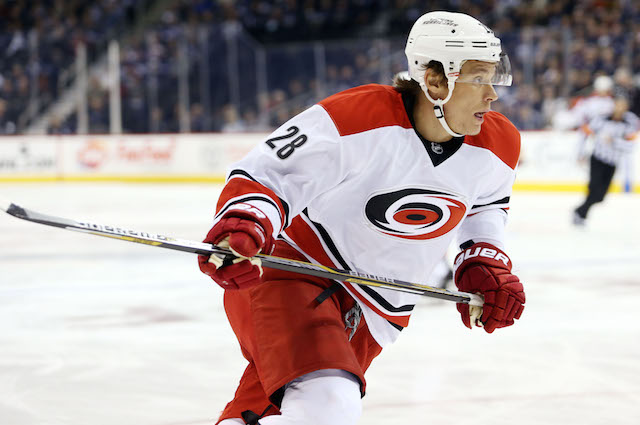
When it was announced Friday morning that Alexander Semin had signed a one-year contract with the Montreal Canadiens, it was a great reminder that there might not be a single player in the league that generates more scorching hot takes from the hockey world.
There is no gray area when it comes to evaluating Semin as a player. Everybody falls into one of two categories, and everybody believes with 100 percent certainty they are right in their analysis.
On one side, you have the numbers argument and the fact that throughout his career Semin has not only been very productive individually, but has also been one of the better players in driving possession for his team. This side tends to focus more on his talent, production and underlying numbers that, in theory, should make a team better. He plays with skill, he can score, and he can be a better defensive player than he is often times given credit for (especially on the penalty kill, where he has been used quite often throughout his career, especially in Washington) and his team is almost always more productive when he is on the ice.
On the other side you have the subjective arguments, usually focussing on effort, laziness, his "coach-killing" tendencies and the belief that he should be capable of so much more in the NHL.
Semin is the laziest least motivated player out there... But MTL needs a top 6 guy and at 1.1 it's a risk I would take
— Matthew Barnaby (@MattBarnaby3636) July 24, 2015
That is actually quite tame (especially since Barnaby admits he is a risk he would take) compared to the ultimate smear campaign that was unleashed by TSN in the summer of 2012, the last time Semin was a free agent and had to settle for a one-year deal.
Finding a middle ground in sports analysis always seems to be difficult because everything has to be extreme. If we're not crowning a player or a team as the best ever or the best in the league right now as soon as they win something, it becomes a competition to see who can deliver the most crushing, brutal takedown of a player or team when they fail to meet our arbitrary expectations.
The truth, though, is almost always in the middle, even if we never seem to want to accept it. Especially when it comes to players like Semin.
Fans of the objective will overstate the numbers to counter the relentless subjective arguments and build him up into something that he's not.
Even though he is a skilled, productive player, he probably isn't the type of player you want to make the focal point of your team -- especially at this point of his career -- or commit to for too long because he can run hot-and-cold with his production (just like any other player will). He will also be a source of frustration because of the occassional missed assignment defensively, poorly timed line change or penalty, or turnover at the blue line because he is trying to do too much on his own with the puck. When it works, it's brilliant. When it doesn't, it's an odd-man rush the other way.
Fans of the subjective will go too far in the opposite direction and hold him up as the posterchild for everything that is wrong with using any form of analytics in hockey because he doesn't always look like he's trying hard, or is lazy, or soft, or a worthless bum that isn't worthy of a spot in the NHL. Alexander Semin has good Corsi numbers and good underlying numbers? Well it must mean that those numbers have no value and are worthless.
Players like Semin tend to draw this type of attention because at times they can make things look so easy that there becomes an expectation that we should see it from them all the time. (Also worth noting: This type of criticism is almost always directed at European and especially Russian players.) It's almost as if the only difference between players like Semin and players like Sidney Crosby and Jonathan Toews is work ethic and compete level. And that's crazy. Sometimes other players are just better.
If we don't see a guy recklessly flying around the ice at 100 mph and hitting everything that moves, there is a tendency to assume that they just don't care or aren't doing everything they can to win. That "energy" is what makes players noticeable when they're not scoring goals or contributing to something. But often times the players that play that type of game (the run around and hit people and overwhelm them with your grit type of game) aren't really helping their teams and simply aren't capable of doing anything else. But because it looks like they're trying really hard, they get more of a free pass because they're playing with heart, even if they will produce less and be a bigger drain on the team than the skilled guy that might not get his nose dirty.
Right now all of the focus with Semin will be centered around his disastrous 2014-15 season with the Carolina Hurricanes and the buyout that followed it. It's also another example of how there is almost always too much focus on a player's most recent performance and not enough on what they might do next. But that season was an outlier in Semin's career. Even his first two years in Carolina, including his first year after signing a long-term contract extension with the team, he still scored at a 25-goal pace over 82 games, a level of production that is good enough to be on just about any top line in the league.
He's probably going to end up being closer to that this upcoming season in Montreal than he was during his final year in Carolina.
Semin will score some goals. He will help the Canadiens stay on the attack more than they would have been without him.
He will also make some mistakes with the puck, make some mistakes away from the puck, and probably draw criticism from Michel Therrien (and maybe even get scratched at some point) for his work ethic.
It will be the type of season where everybody can claim to be right in their analysis of Semin, and then we will go through the exact same thing next summer when he remains unsigned until the end of July and signs on for another one-year deal.





















